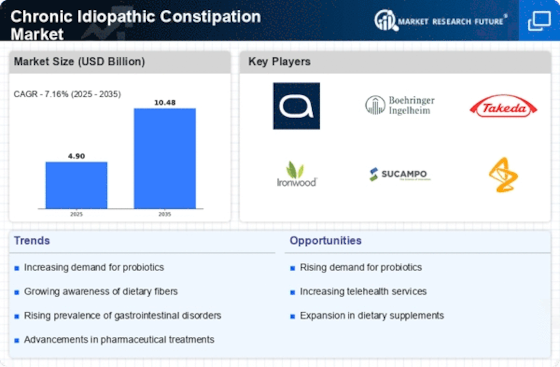Market Trends
Key Emerging Trends in the Chronic Idiopathic Constipation Market
“The market trends in chronic idiopathic constipation (CIC) reflect a dynamic landscape influenced by medical advancements, evolving treatment strategies and an increasing consciousness of digestive health problems. One significant trend observed is the escalating rates of CIC cases globally. The rise in lifestyle factors, such as sedentary behavior, poor nutrition, and stress, are contributing to the increase in chronic constipation. Better understanding and identification of CIC in addition to increasing aging population has seen people seek for medical intervention on this common digestion disorder. This is one trend that highlights the need for solutions that will effectively address the impact of chronic idiopathic constipation on individuals’ quality life.
The market for CIC is shaped by improvements in diagnostic devices and treatment options. Rome IV criteria have also been instrumental in helping healthcare providers diagnose chronic constipation correctly and classify it accurately. Similarly, current innovative diagnostic equipment like colon transit studies or anorectal manometry enlighten on causative factors facilitating personalized methods of therapy against CIC. This drives forward to more specific comprehension about the condition thereby allowing individualized approaches to care with respect to patients with chronic idiopathic constipation.
Gastrointestinal drugs targeting CIC have come up due to a number of reasons including focus by pharmaceuticals industry. Examples of symptom management choices include conventional laxatives, fibre supplements as well as newer drugs like guanylate cyclase-C (GC-C) agonists plus prokinetic agents among others. Ongoing research on selective serotonin agonists constitutes another class of medications widening therapeutic options for those suffering from CIC. This shows effort towards refining treatment modalities thus improving patient outcomes while acknowledging complexities associated with CID.
Market shifts towards this condition have been triggered by an increased recognition about gut-brain axis’s role concerning digestive health especially related to CIC. Psychosocial factors such as anxiety, negative emotions and mental health greatly influence GI functioning. The integrated understanding between these two complex organs is guiding development of holistic interventions meant to address both psychological and physical facets of CIC. Behavioural changes and life style modifications alongside pharmacologic options are more patient-centered and holistic.
The landscape of care for CIC is influenced by the collaboration between healthcare professionals, researchers and pharmaceutical companies. This is based on establishment of multidisciplinary teams that encompass gastroenterologists, dietitians, mental health experts among others in order to provide a comprehensive coordinated approach to patients’ care. The ongoing collaboration also contributes to clinical trials as well as research endeavors that target CIC pathophysiology and treatment approaches.
CIC care involving telemedicine alongside digital health technologies facilitates remote consultations, patient education as well as continuous support. These technologies allow improved access especially among those with chronic idiopathic constipation who may be shy because of the condition’s nature. This move towards virtual healthcare solutions corresponds with increasing adoption of digital health tools thereby offering a user-friendly alternative for managing digestive health problems.
The management strategies for chronic idiopathic constipation are moving towards prevention and patient awareness; hence, they are becoming prominent issues. To prevent or stop its recurrence healthcare providers concentrate on lifestyle changes, dietary adjustments plus behavior modifications among other things. It suggests that CIC can be managed earlier by making individuals knowledgeable while giving them power through applicable tools that have been tested over time so that they make more sustainable choices about their eating habits.


















Leave a Comment